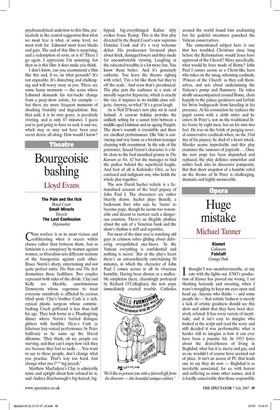Bourgeoisie bashing
Lloyd Evans The Pain and the Itch Royal Court Small Miracle Tricycle The Last Confession Haymarket Class warfare is at its most vicious and exhilarating when it occurs within classes rather than between them. Just as feminism is a conspiracy by women against women, so liberalism sets different sections of the bourgeoisie against each other. Bruce Norris's sharp, entertaining and not quite perfect satire The Pain and The Itch dramatises these faultlines. Two couples represent both sides of the divide. Clay and Kelly are likeable, sanctimonious Democrats whose eagerness to treat everyone sensitively is afflicted by curious blind spots. Clay's brother Cash is a rich, cynical plastic surgeon whose commiebashing Czech girlfriend is less than half his age. They lock horns at a Thanksgiving dinner where Norris's barbed dialogue glitters with hostility. Here's Cash (a hilarious lazy-voiced performance by Peter Sullivan) as he sums up the liberal dilemma. 'They think, oh no, people are starving, and they can't enjoy how rich they are because they feel so tacky. ... You want to say to these people, don't change what you practise. That's way too hard. Just change what you f***ing preach.'
Matthew Macfadyen's Clay is admirably tense and uptight about how relaxed he is, and Andrea Riseborough's big-haired, biglipped, big-everythinged Kalina slyly evokes Ivana Trump. This is the first play directed by the Royal Court's new supremo Dominic Cook and it's a very welcome debut. His predecessor favoured plays about thick, damaged losers and they made for uncomfortable viewing. Laughing at the educated wealthy is a lot more fun. You know them better. And it's genuinely cathartic. You leave the theatre sighing with relief, 'I'm a bit like them but they're off the scale.' And even that's paradoxical. The play puts the audience in a state of morally superior hypocrisy, which is exactly the vice it imputes to its middle-class subjects. Anyway, so what? It's a great laugh.
As is Neil D'Souza's new play set in rural Ireland. A caravan holiday provides the unlikely setting for a sunset tryst between a middle-aged Irishman and an ageing Punjabi. The show's warmth is irresistible and there are excellent performances. Ella Vale is convincing and very funny as a lovelorn teenager churning with resentment. In the role of the pensioner, Souad Faress's character is a little close to the foul-mouthed granny in The Kumars at No. 42 but she manages to find the pathos behind the superficial laughs. And best of all is Kulvinder Ghir, as her confused and indignant son, who holds the whole play together.
The new David Suchet vehicle is a fictionalised account of the brief papacy of John Paul I. The characters are rather blurrily drawn. Suchet plays Benelli, a backroom fixer who says he 'burns' to become pope, though he seems too reasonable and decent to nurture such a dangerous emotion. There's an illegible plotline about the sale of a Venetian bank and the show's rhythm is stiff and repetitive.
For most of the time you're watching old guys in crimson robes gliding about delivering overpolished one-liners. 'In the Vatican everything is confidential and nothing is secret.' But at the play's heart there's an extraordinarily entertaining 50 minutes, in which the character of John Paul I comes across in all its vivacious humility. Having been chosen as a malleable simpleton (here, charmingly portrayed by Richard O'Callaghan), the new pope immediately created trouble. Catholics around the world found him enchanting but his guileful sweetness panicked the Vatican conservatives.
The unmentioned subject here is one that has troubled Christians since long before the Reformation: would Jesus have approved of the Church? More specifically, what would he have made of Rome? John Paul I comes across as a Christ-like hero who takes on the smug, scheming cardinals, 'Princes of the Church' as they call themselves, and sets about undermining the Vatican's pomp and flummery. He takes strolls unaccompanied around Rome, chats happily to the palace gardeners and forbids his Swiss bodyguards from kneeling in his presence. At his coronation he replaces the papal crown with a cloth mitre and he enters St Peter's, not on the traditional litter borne by eight men, but on his own two feet. He was on the brink of purging several conservative cardinals when, on the 33rd day of his papacy, he died of a heart attack. Murder seems improbable and this play examines the rumours of papicide ... Once the new pope has been dispatched and replaced, the play deflates somewhat and settles back into its discursive pomposity. But that short snapshot of a humble rebel on the throne of St Peter is challenging, dramatic and highly memorable.



















































 Previous page
Previous page